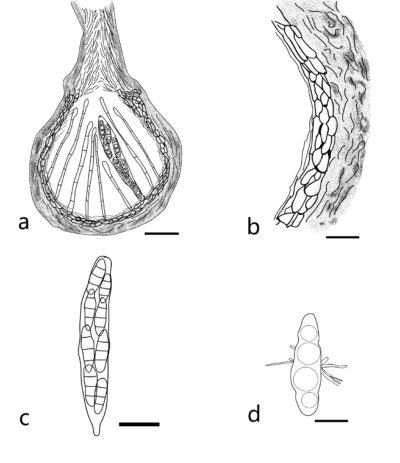Fungalpedia – Note 464, Marinokulati
Marinokulati E.B.G. Jones & K.L. Pang
Citation when using this data: Tibpromma et al. 2024 (in prep.) – Fungalpedia, Extreme-tolerant fungi.
Index Fungorum, Facesoffungi, MycoBank, GenBank, Fig. 1
Classification: Juncigenaceae, Incertae sedis, Hypocreomycetidae, Sordariomycetes, Pezizomycotina, Ascomycota, Fungi.
Based on the morphological and phylogenetic analyses, Chaetosphaeria chaetosa differs significantly from other Chaetosphaeria and Juncigena species (Jones et al. 2014). Therefore, the new genus Marinokulati was proposed to accommodate C. chaetosa by Jones et al. (2014), with the type species M. chaetosa. Chaetosphaeria chaetosa was described by Kohlmeyer (1963) and referred to Sphaeriaceae. However, Jones et al. (1983) mentioned that its taxonomic placement is unrelated to other Chaetosphaeria species, as it differs from other species in asci and ascospores with both polar and equatorial appendages, formed by fragmentation of an exosporic sheath, while no asexual stage has been reported for C. chaetosa. Read et al. (1992) also confirmed that the taxonomic position of C. chaetosa should be further examined. Fresh collections of the marine ascomycete C. chaetosa was collected by Jones et al. (2014), they evaluated the phylogenetic relationship with other Chaetosphaeria species and established the new genus Marinokulati to resolves its taxonomic position, and a new combination was proposed (M. chaetosa). To date, Marinokulati has only one species and is widely distributed in temperate climates on intertidal and drifting wood (Jones et al. 2014). Marinokulati was reported only sexual morph and is characterized by subglobose to pyriform ascomata, long necks, ostiolate, and periphysate, septate paraphyses, with 8-spored asci, unitunicate, cylindrical, attenuate at the base, thick walled at the apex with a perforated apical apparatus, and fusiform to elongate ellipsoidal ascospores, 3-septate, hyaline, with polar and equatorial appendages (Jones et al. 2014).
Type species: Marinokulati chaetosa (Kohlm.) E.B.G. Jones & K.L. Pang
Other accepted species: This genus is monotypic.
Figure 1 – Morphology of Marinokulati chaetosa. a Vertical section of ascoma. b Peridium. c Ascus. d Ascospore. Scale bars: a, c = 40 μm, b, d = 10 μm. Redrawn from Jones et al. (2014).
References
Kohlmeyer, J. (1963). Fungi marini novi vel critici.
Entry by
Lu L, Center for Yunnan Plateau Biological Resources Protection and Utilization, College of Biological Resource and Food Engineering, Qujing Normal University, Qujing, Yunnan 655011, China; Center of Excellence in Fungal Research, Mae Fah Luang University, Chiang Rai 57100, Thailand; School of Science, Mae Fah Luang University, Chiang Rai 57100, Thailand.
(Edited by Saowaluck Tibpromma, Samaneh Chaharmiri-Dokhaharani, & Achala R. Rathnayaka)
Published online 3 December 2024
